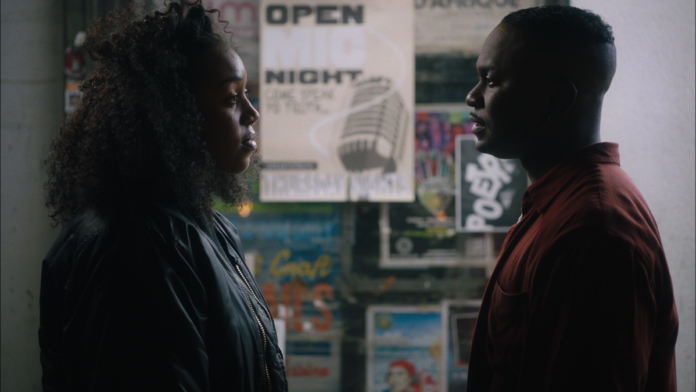( ENSPIRE Entertainment ) Grand Jury Prize Winner And Premiered In Several Film Festivals
ENSPIRE Contributor: Gabrielle Maya
Black Man Films is known for its entertainment influence, elevating Black and Brown voices in the industry. Co-Founder Roderick Lawrence (Tina Turner Musical) and Salma Qarnain (Life of Pi) are both familiar on Broadway. Dominating the independent film circuit, Black Man Films newest short film, “Speak Up Brotha!” made its world premiere in Spring 2023 at the Oscar Qualifying Cleveland International Film Festival. Roderick Lawrence created and starred in “Speak Up Brotha!” and featured Terrence “T.C.” Carson (2023 NAACP Image Awards Nominee, “Living Single”). The short film garnered 21 festival acceptances (4 Oscar qualifiers; 8 awards and nominations), was a finalist in the HBO MAX® Latino Short Film Competition, and qualified for the 2023 Oscars. The feature version is set to shoot this winter.
“Speak Up Brotha!” is an ode to 90s Black romance films; examples include “Love Jones” and “Poetic Justice.”It gives a new perspective on Black love and relationships. Directed by Wes Andre Goodrich and co-written by spoken word artist Obbie West and James J. Johnson, lensed by Nona Catusanu and produced by Salma Qarnain in association with Ron Gillyard, Will Campbell (Quantasy Studios) and Dario Harris (Emmy award-winner). “Speak Up Brotha!” recently won the Grand Jury Prize at the 26th Annual Dances with Films: LA, which was held at the TCL Chinese Theatre.

Roderick Lawrence is an acclaimed actor who brought authenticity and powerful messaging to the production. In 2022, he was a BronzeLens Film Festival Best Actor recipient and 2020 Audelco nominee. He has been credited with many performances, including Simba in Disney’s “The Lion King National Tour,” Ramses in the Broadway-bound “The Prince Egypt,” Othello in John Leguizamo’s “Othello: The Remix,” Floyd Barton in “August Wilson’s Seven Guitars,” and Jesus in “Godspell.”
Lawrence is currently starring as Ike Turner in the National Tour of Broadway’s “Tina: The Tina Turner Musical.” He trained at and received his B.M. in Music Theatre at Baldwin Wallace Conservatory of Music, one of the country’s top five music theatre conservatory programs. His Co-Founder of Black Man Films, Salma Qarnain, is a Pakistani-American interdisciplinary leader and storyteller with executive-level P&L experience across Aerospace, the Internet, Media and Entertainment, and Education.
Lawrence tells us his motivation in pursuing film and entertainment, the challenges and successes when starring in film or on Broadway, his feature on “Tina: The Tina Turner Musical” experience, Black Man Films, the purpose and importance of “Speak Up Brotha!” and more.
What was your real motivation for pursuing a career in Film and entertainment?
My motivation has proportionately grown over the years. Initially, it was because it is what I love to do, and my gifts are as a storyteller and as an actor. That is what I realized I was the best at and what I love. I have been fortunate to realize that my gifts are not just for me but from God, and to figure out how to help others through what I do. That is what Black Man Films is about. It is a way to take care of myself and the people close to me and serve and help everybody else.
What are some of your biggest challenges and successes when starring in film and on Broadway? How would you say you have evolved as an artist and entertainer?
The biggest challenge is just sticking to your purpose when things aren’t going well. How to traverse through adversity, and how you can walk into every audition room and take it as a learning experience and an opportunity to make friends even when you don’t have a job. How to deal with rejection, have patience and perseverance, and keep yourself focused on the overall mission.
I don’t like to call myself an entertainer. I am an artist, and art imitates life. I have a tattoo that says, “Life is a Mistake That Only Art Can Correct.” The more shows I have done and continue to study and grow in my artistry, the more tools I have gotten in my tool belt. My gifts are my gifts, my talents are my talents – but still, as you grow, you will get more tools in your tool belt so you can lift your talents to new heights. Every time a new opportunity comes up, I have to do a new challenge, whether it is taking on a new personality, a new accent, or whatever. I am constantly growing and evolving.
Tell us your current experience working in the production of “Tina: The Tina Turner Musical.”
Playing Ike taught me a lot of things, not only about this broken legend but also about myself and about folks’ coping mechanisms and breaking points. Playing someone who battled this way with himself and then with everybody around him every day puts you in an interesting space. I had to learn that on every show, you want to keep your work (as) your work and be able to dive into the character, then separate it from your mind so you can go home and be ok. I had to dig deep into myself so that this role came out the way it did without tearing away parts of me, and that is really hard working on roles like this one.

How did Black Man Films become an independent film company, and what is your ultimate vision for this company?
It became a company during COVID-19 when I had the idea to make a film about black mental health and the effects of microaggressions. That is when we made Silent Partner. Because I had the vision of the film to hire all black people on set, a black director, and black writers, Salma asked me if I ever thought of owning a production company. I said no. She talked me into it. I told her that I would only do it if the name Black Man Films was available. She checked, and the name was available, the domains and everything – and that is how we became Black Man Films. The ultimate goal is to become one of the biggest production companies in the world that focuses on telling black and marginalized people’s stories authentically and through their eyes – but through the eyes of quality. It is to make sure that black people are getting the same shine in the media that everyone else gets.
For future audiences, describe the importance and purpose of “Speak Up Brotha!” and its expected impact on the film industry and the Black community.
The importance of Speak Up Brotha! is it is a love story that talks about communication issues, and mental health issues, and it stars all black people but it doesn’t have to be called a black film. That is the importance of it. It is just a film that everyone can relate to on a relationship tip, anxiety tip, or communications tip – but it is not just a black story.
It is an ODE to 90s black films which was our most prominent era for romance films. Love Jones, Poetic Justice, Brown Sugar, The Best Man. So, the focus is just to bring back that beautiful love storytelling and also address some issues that even those movies didn’t capture, like mental health and love languages.
As far as its impact on the black community, I think the black community needs to see us put love and craft and expertise and passion into our work so that we know that we don’t support the films just because they are black films. We want to support GREAT black films. We should see ourselves in phenomenal films like this, and it is a testament to what you can do with an all-black crew of experts who are great at what they do. I want us to take our craft seriously, regardless of what everyone else is doing.
In your words, what do you feel needs to change within the entertainment industry to give a larger voice to black artists, and artists from and other backgrounds in Broadway, Film, TV, and Media?
People need to stop labeling films starring black people as black films. We need to support each other. We need to stop worrying about how to make other people like us more. Make the best art for ourselves and support the art. If we make trash, they’ll support trash because they don’t care as long as they make money off of it. We need to hold ourselves accountable.
They always say – “you have to be 100 percent better to get half as much.” When did that stop with making films? Because we are not seeing as much quality out there as we should.
I’m glad that I can be part of the catalyst for changing that because that is what’s going to change everything. If we make the best products and they don’t support us, then we can support ourselves and eventually other people will want it. We can only control what we can control.

Are there other short films you and Salma Qarnain are creating right now that you are excited about? What should we be on the lookout for?
No more short films. It was a beautiful experiment, and we were fortunately very successful in it and still successful. We did co-produce an upcoming short that was written and directed by Cameron Carr who is our Assistant Director on Speak Up Brotha. It is his directorial debut. Salma is the Executive Producer on it and Black Man Films is the co-producer. The film is called Harlem Fragments and is presented by FujiFilm. I am one of the leading actors. It will be on the festival circuit early next year. Then, we are making the feature film of Silent Partner. We start shooting in January 2024.
The short film has been officially selected in 9 festivals, holding its Southern premiere at the American Black Film Festival (ABFF); its West Coast premiere at the prestigious Dances with Films: LA at the TCL Chinese Theatres; its Northeastern premiere at the Oscar-qualifying Martha’s Vineyard African-American Film Festival (MVAAFF) and its Atlanta premiere at the Oscar-qualifying BronzeLens Film Festival. Other screenings included the Morehouse College Human Rights Film Festival and the Detroit Black Film Festival.
For more information and updates on “Speak Up Brotha!,” visit www.speakupbrotha.com or follow their Instagram at @speakupbrothafilm. Follow Roderick Lawrence and Salma Qarnain on their Instagram. Visit their site https://www.blackmanfilms.com/ for more current news on all their entertainment and short films.
Related Articles: Salma Qarnain Co-Founder of Black Man Films Brings Inclusivity, Short Film “Heartbeat” Had Premiere Panel on Mental Health







